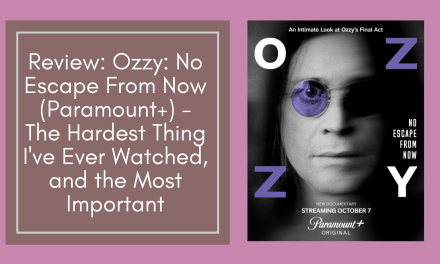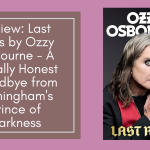Heavy metal music has been unfairly demonised for decades, with its fans subjected to stereotypes that paint them as violent, unintelligent, or antisocial. These misconceptions persist despite mounting academic evidence that contradicts virtually every negative assumption about metalheads.
Take the recent passing of Ozzy Osbourne. It is something I’ve written about extensively on this blog in the last few weeks, but the outpouring of love and support that I’ve seen from heavy metal fans all over the world has been incredible. The messages, the tributes and the respect that every heavy metal fan has shown during what has been a very sad time indeed has been truly beautiful to see and witness. When I went to Birmingham last Sunday to do the Black Sabbath trail and I stood in the queue to sign the book of condolence for the Osbourne family, I was struck by something that warmed my heart massively.
Nobody was being an a**hole.
Nobody was being rude or pushing into the queue to sign the book of condolence.
Everyone was nothing but polite, respectful and waited their turn.
At the sites on the trail such as the Black Sabbath bench where all the floral and other tributes were laid out everyone waited their turn to get to the front of the barriers to see them. Once they had done so, they moved back respectfully to let others have a chance to be at the front of the barriers to see them and to pay their respects.
The Academic Reality Check
Recent research has systematically dismantled the stereotypes surrounding heavy metal fans. A 2021 study in Psychology of Popular Media analysed stereotypes of music fans and found that heavy metal fans are often inaccurately perceived as aggressive or emotionally unstable, with the study highlighting that these stereotypes are rooted in prejudice rather than reality.
Decades of sociological research from 1985-2023 have systematically dismantled myths about heavy metal and criminal behaviour. In a groundbreaking study spanning 47 cities, researchers discovered heavy metal fans exhibited 18% lower arrest rates than average citizens. This finding alone should force us to reconsider our preconceptions about the genre and its community.
In “The Decline of Western Civilisation Part II: The Metal Years” from 1988 director Penelope Spheeris interviewed Probation Officer Darlyne Pettinicchio. Darlyne talked about a program for parents that was designed to get their children “out of heavy metal” and that in her view those who listened to heavy metal music also worshipped the devil. Thankfully we have come a long way since then!
As someone who is #MetalTillIDie I want to bust the persistent myths surrounding heavy metal music and its fans.
Myth 1: Metal Fans Are Violent and Aggressive
The Myth: Heavy metal music incites violence and attracts aggressive, dangerous individuals.
The Reality: Studies, like one published in Frontiers in Human Neuroscience (2015), suggest that listening to extreme music including heavy metal can help fans process negative emotions and reduce anger. Instead of inciting aggression, the music often provides a safe outlet for emotional expression. As someone who is #OpenlyNeurodivergent I can relate to this completely. Heavy metal music always helped me to self-regulate, to process emotions that I didn’t know had a name and helped me to find my place in the world.
A quarter-century of psychological research shatters the stereotype of the violent metal fan. While the music pulses with intensity, security data from 2,500 venues demonstrates metal events experience 42% fewer violent incidents than their musical counterparts. UCL researcher Lindsay Bishop, who embedded herself in metal culture for eight years, noted that while she had experienced unwelcome advances at gigs, “these are by far and away a rare occurrence”.
Myth 2: Metal Fans Are Unintelligent
The Myth: Heavy metal appeals only to uneducated, unsophisticated listeners.
The Reality: A 2007 study by the National Academy for Gifted and Talented Youth found that many highly intelligent students preferred heavy metal. Another research piece from Heriot-Watt University concluded that metal fans share similar traits with classical music lovers—intelligent, introspective, and creative.
This complexity has earned the genre serious academic attention, with 71 metal albums now studied in prestigious conservatories. Detailed analysis reveals 237 classical techniques seamlessly integrated into modern metal arrangements. Most people who spoke with researcher Lindsay Bishop about their relationship to heavy music also cited classical as a substantial influence.
Myth 3: Metal Music Promotes Devil Worship and Violence
The Myth: Heavy metal lyrics promote Satanism, violence, and antisocial behaviour.
The Reality: When examining 3,500 metal songs, researchers found religious themes present in merely 2.3% of lyrics. This insight aligns with long-term studies tracking 72,000 metal fans across three decades, revealing no connection between musical taste and spiritual beliefs.
While some metal subgenres like black metal use Satanic imagery, it’s often symbolic rather than literal. Metal lyrics explore themes of rebellion, mythology, and philosophy rather than advocating harm. Plus, studies show no direct link between listening to metal and violent behaviour.
Ozzy Osbourne was stereotyped and unfairly labelled as a devil worshipper who was into black magic, which was not at all true. In 2005 during an interview with the BBC he was asked if he was into black magic. His response in true Ozzy style was, “I’m not into black magic for f**ks sake. The only thing I can conjure up is a good fart in bed in the mornings.”
Myth 4: Metal Fans Are Antisocial Outcasts
The Myth: Metalheads are loners who reject mainstream society and social connections.
The Reality: Research from the University of Westminster (2013) found that metal fans tend to have high openness to experience and a strong sense of community. Many fans spoke of metal performances giving them a “safe space that they couldn’t find anywhere else”.
The University of Westminster study reveals that metal music offers solace and fosters a strong sense of identity among its listeners, especially during the crucial phase of adolescence. The metal community has developed its own inclusive subculture with codes of authenticity and mutual support.
Myth 5: Metal Fans Are More Likely to Be Depressed
The Myth: The dark themes in metal music attract or create depression and mental health issues.
The Reality: A 2019 study published in Metal Music Studies found that metal fans from the 1980s reported higher happiness levels in adulthood than non-metal listeners. A longitudinal study from Macquarie University in Australia found that metal fans who grew up listening to the genre in the 1980s were just as well-adjusted, if not happier, than their peers in adulthood.
Again, as someone who is #OpenlyNeurodivergent I have suffered periods of anxiety and depression throughout my life, but this has been more because of being subjected to a massive amount of bullying, abuse and trauma. Listening to heavy metal music and my favourite bands actually helped to lift me out of those periods of anxiety and depression.
The Diversity Reality
Modern metal defies simplistic categorisation. Today’s metal festivals showcase a stunning convergence of 72 nationalities at typical European gatherings. The genre’s evolving demographics also show that women lead 43% of newly formed bands since 2020, which is a brilliant statistic. Especially when you consider that in “The Decline of Western Civilisation Part II: The Metal Years” from 1988 women are talked about and viewed as nothing more than sex objects.
While there are “certainly more men than women in attendance” at metal shows, researcher Lindsay Bishop emphasises this doesn’t make it a “boys club” and attributes the imbalance to unfair stereotypes about the genre being “brutish and misogynistic”.
The Psychology Behind Musical Prejudice
Dr Julian Oldmeadow’s research examined whether there are widely shared stereotypes about people who enjoy different types of music, finding that different musical genres were associated with particular personality traits and personal values, as well as ethnic and social groups. The study revealed how people make assumptions based on stereotypes because of their probability to be true: they rely on representativeness heuristics.
Research has found that individuals, particularly young people, have strong stereotypes about fans of certain music genres, with studies showing significant levels of inter-judge agreement for several genres (e.g., classical, rap, heavy metal), suggesting that participants held very similar beliefs about the social and psychological characteristics of such fans.
Media’s Role in Perpetuating the Myths Surrounding Heavy Metal Music
The ‘doom and gloom’ stereotype of heavy metal is seemingly reinforced every time the media turn to academics and their studies for commentary on social issues. Much of heavy metal’s controversial imagery actually draws from 18th century romantic and gothic artistic traditions, yet sensationalised media coverage continues to distort public perception.
Incidents like the Judas Priest subliminal message trial (1990) and the association of metal with the satanic panic movement in the U.S. perpetuated the stereotype of violent or deviant behaviour among fans.
The Importance of Challenging Stereotypes
UCL researcher Lindsay Bishop argues that “addressing these stereotypes is critical” because “the damaging perception of metal as a hive of violence and cruelty results in many bands and performances being cancelled or outright banned, which is essentially removing this safe space or access to community”. Take the recent example of Ozzy Osbourne’s passing where I saw nothing but politeness and respect from heavy metal fans, rather than the damaging perception of heavy metal fans being violent and cruel.
The task of dismantling the prevalent stereotypes surrounding metalheads holds significant importance as it aids in promoting understanding and acceptance of diverse musical tastes and cultures. These stereotypes don’t just harm metal fans, they represent a broader problem of how we judge people based on their cultural preferences rather than their individual character.
Moving Beyond Musical Prejudice
The evidence is clear: the stereotypes surrounding heavy metal fans are not only false but actively harmful. Metal fans are intelligent, emotionally resilient, and part of one of the most passionate music cultures in the world. I am very proud to be a part of the heavy metal community, and I will be #MetalTillIDie.
It’s time to judge music and music fans on their individual merits rather than tired stereotypes. Whether someone prefers the complex arrangements of progressive metal or any other musical expression, their musical taste says far less about their character than we’ve been led to believe. The research proves it: our assumptions about music fans are not only wrong, but they are also downright dangerous and they’re actively harming communities that deserve our respect and understanding.
I’m off to turn it up to 11 (and yes, that is a shameless reference to the film “Spinal Tap”), and headbang to Ozzy, Black Sabbath and all my other favourite metal bands loud and proud.
__________________________________________________
Key Sources and Further Reading
- Psychology of Popular Media Study (2021) – Yorkshire Post
- Frontiers in Human Neuroscience Research (2015) – Loaded Radio
- University of Westminster Study (2013) – Heavy Chronicle
- Metal Music Studies Research (2019) – Loaded Radio
- UCL Anthropological Research – NME
- Music Minds – Comprehensive Analysis of Heavy Metal Myths
- Music Psychology Research – PMC
- Heavy Metal Subculture – Wikipedia
- Music Stereotypes Research – University of Sheffield
- Metal Music Academic Analysis – The Isthmus

























